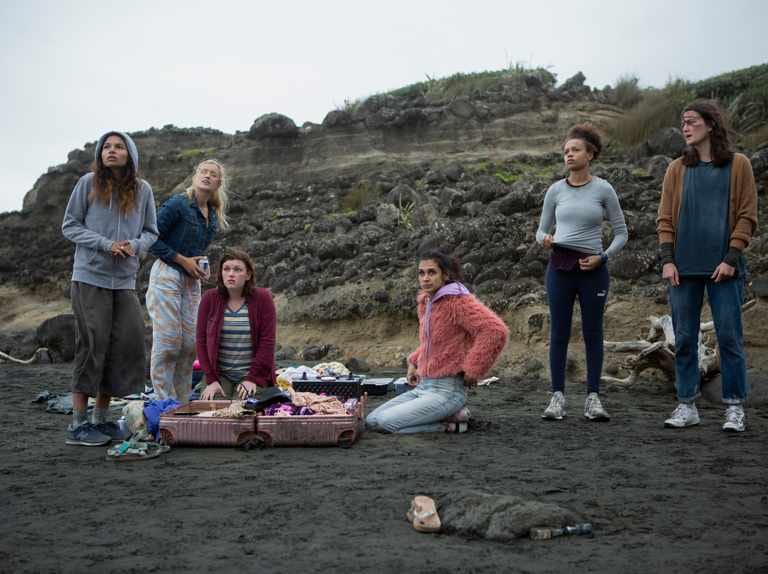In The Wilds, You Can't Get Away From the Patriarchy
Season 2 of the feminist survival drama.
7.8/10 stars
Pop culture feminism often takes the form of rah-rah girl power empowerment, with Wonder Woman, Captain Marvel, Charlie’s Angels, Black Widow, the 355, or some other heroic super generally white woman beating the tar out of oppressive scheming men.
Cathartically overthrowing the bad guys can be fun. But Amazon Prime’s trashy YA adventure series The Wilds surprisingly takes a more subtle, and in many ways more painful approach. Even completely cut off from civilization, the patriarchy is everywhere; there’s no one person you can punch. Nor, as a system of dominance and control, does the patriarchy just immiserate girls. It comes for young people of every gender.
In the first season of The Wilds, released back in 2020, nine girls boarded a plane to the Dawn of Eve, a girl’s empowerment retreat in Hawaii. En route they crash land and are stranded on a deserted island. Over the course of the ten episode season, you learn about their backstories as they struggle to survive storms, starvation, food poisoning, and lots of interpersonal drama.
You also learn early on that the situation is a set up. The crash was staged by brilliant obsessive scientist Gretchen Klein (Rachel Griffiths). Klein wants to prove that women are better suited to survive and govern than men. The island is an engine designed to traumatize women into becoming empowered.
Gretchen’s scheme requires a control group, which is where the second season kicks off. She sets up another retreat and another plane crash, but this time with all boys. The eight episodes shift back and forth between the girls’ island, the boys’ island, and the debriefing afterwards, in which Gretchen and her associates pump the unwitting teens for information about their experiences in an effort to get them to prove Gretchen’s theories about female superiority.
And Gretchen does get some fodder for her thesis. Part of what’s exhilarating about the second season is watching the group of girls fuse into a juggernaut of mutual aid. The actors provide uniformly thoughtful performances as they reveal layer after layer beneath the sun-burned, peeling skin. By the second season they are passing strength and vulnerability from character to character like partners in a gracefully awkward dance.
Vegetarian beautifully passive soul Martha (Jenna Clause) becomes the group’s hunter. Promiscuous high maintenance party girl Fatin (Sophia Ali) becomes a spiritual rock and even climbs a tree. Volatile hothead Toni (Erana James) turns into the calm anchor for closeted upbeat beauty queen Shelby (Mia Healey). Whiny love-starved Leah (Sarah Pidgeon) transformes her haplessness into a weapon. And then sometimes, all they’ve learned forsakes them and they collapse. And then their friends pick them up.
The boys are a stark contrast. At first the affable leadership of Seth Novak (Alex Fitzalan) seems to put them on the right path. But an act of rage and violence makes it impossible for them to work together or to form the kind of cohesive whole that allows the girls to overcome even the loss of an arm or betrayal. The worst thing on the island isn’t a jaguar or hunger but something they brought with them. Their moral and strategic efforts to understand that and deal with it are worked through with a remorseless sadness.
Gretchen takes the boys’ failures and the girls’ successes as confirmation. Male patriarchal energy messes everything up, Gretchen is certain; girls freed from men will save the world. But the show never validates that interpretation. On the contrary, its scrambled chronology is designed to remind you just how artificial Gretchen’s experiment is.
The girls and boys aren’t battling the elements with Gretchen. They’re being gaslighted, manipulated, and tormented by Gretchen, who has power over them in large part because she’s an adult. Patriarchy isn’t just a system for controlling women; it’s a system for controlling children.
Most of the young people on the islands were sent to Hawaii by their parents as a punishment or as a means of discipline—to make them more responsible, less depressed, less angry, less rebellious, and, in Shelby’s case, less gay. Gretchen claims to want to move to a more female mode of authority and development. But her experiment is predicated on diverting parental, patriarchal power to her own purposes, and on arrogating to herself absolute godlike authority to manipulate, lie, and control. She doesn’t collaborate with her subjects. She commands and brutalizes them.
The end of the second season is rushed and somewhat unsatisfying, not least because it turns into one person’s triumph rather than building on the series’ carefully cultivated group dynamics. But there’s a certain justness to the disappointment, too.
Systems of oppression are hard to overthrow; there’s no one simple narrative of successful revolution. The young people in The Wilds, of every gender, grow and resist despite Gretchen, not because of her—and she’s always trying, with more or less competence, but with a lot of power, to crush them down again, all while claiming it’s for their own good.
The show’s twists are often silly, and the plot is obviously contrived. But patriarchy often feels like a transparently artificial, needlessly intricate torture device. Everyone would get off that island, The Wilds knows, if only the showrunners weren’t constantly dropping you back there.
First published April 2022.


